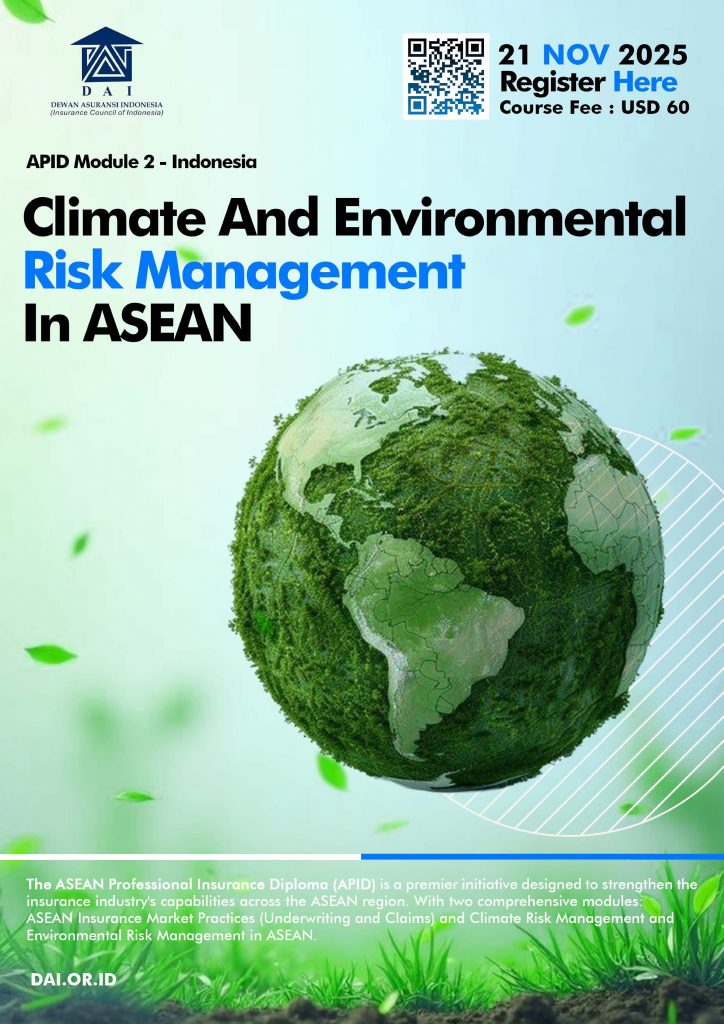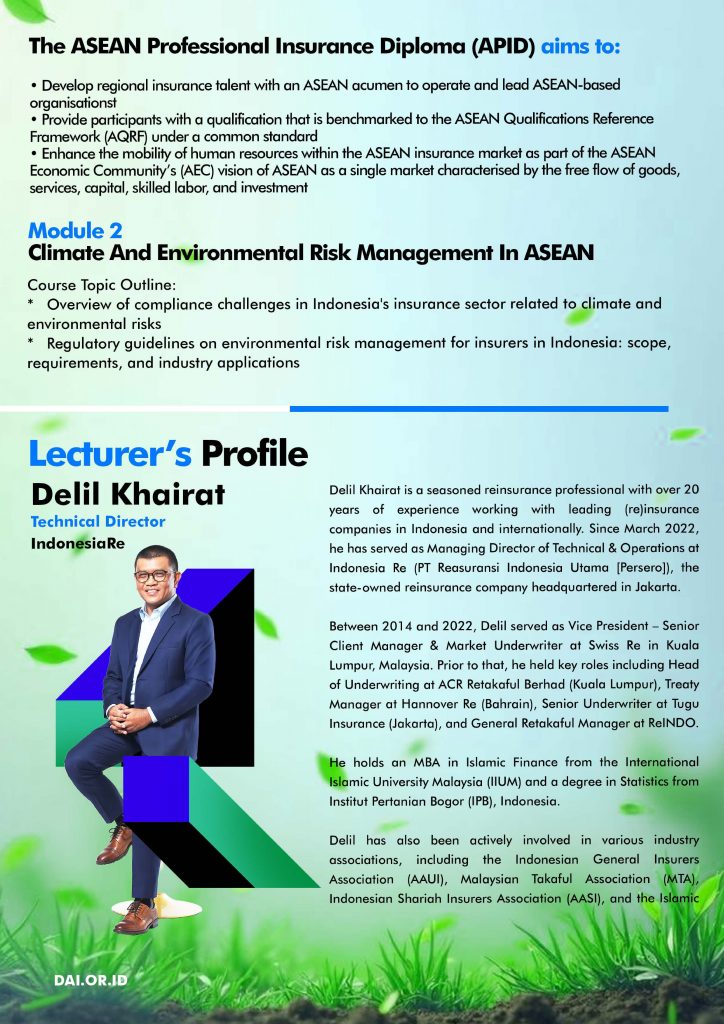ASEAN Professional Insurance Diploma (APID)
Module 2 – Indonesia Climate And Environmental Risk Management In ASEAN
14:00 PM – 17:00 PM (GMT + 7) Jakarta | 21 November 2025
Registration Deadline : 19 November 2025
FEE & REGISTRATION
Normal Fee: USD 60/IDR. 1.260K


INTRODUCTION
The ASEAN Professional Insurance Diploma (APID) was launched by the ASEAN Insurance Education Committee (AIEC) in collaboration with five ASEAN training providers:
Indonesia: Insurance Council of Indonesia (DAI)
Malaysia: The Malaysian Insurance Institute (MII)
Philippines: Insurance Institute for Asia and the Pacific (IIAP)
Singapore: Singapore College of Insurance (SCI)
Thailand: Thailand Insurance Institute (TII)
The main purpose of the ASEAN Professional Insurance Diploma (APID) is to:
- Develop regional insurance talent with an ASEAN acumen to operate and lead ASEAN-based organisations
- Provide participants with a qualification that is benchmarked to the ASEAN Qualifications Reference Framework (AQRF) under a common standard
- Enhance the mobility of human resources within the ASEAN insurance market as part of the ASEAN Economic Community’s (AEC) vision of ASEAN as a single market characterised by the free flow of capital, skills, and resource
Module Information of APID
- APID consists of two modules:
- Module 1: ASEAN Insurance Market Practices (Underwriting and Claims)
- Module 2: Climate Risk Management and Environmental Risk Management in ASEAN
- Module 1: 5 micro-certs in total (1 per country), duration of two days per micro-cert (10 days total)
- Module 2: 6 micro-certs in total (1 foundation micro-cert and 5 country-specific micro-certs for each country), duration of three days for foundation micro-cert and half day for country-specific micro-certs (5.5 days total)
OBJECTIVE
Develop regional insurance talent with an overarching understanding of the ASEAN insurance Industry to operate and lead in ASEAN-based organizations.
Enhance talent mobility within the ASEAN insurance market as part of the ASEAN Economic Community’s (AEC) vision of ASEAN as a single market characterized by the free flow of capital, skills and resources.
LEARNING OUTCOMES
- In-depth understanding of climate and environmental risks in the insurance sector.
- Enhanced competence in regulatory compliance.
- Ability to apply environmental risk management guidelines in industry practice.
- Readiness to address sustainability and ESG (Environmental, Social, and Governance) requirements.
- Strengthened professional competitiveness in the insurance and sustainable finance sectors.
Upcoming Schedule 2025
Module 1 : ASEAN Insurance Market Practices (Underwriting and Claims)
→ 5 micro-certifications:
Micro-Cert 1: Malaysia (2 days) : Asian Institute of Insurance (Aii) – 24 & 25 March 2025
Micro-Cert 2: Philippines (2 days) : Insurance Institute for Asia and the Pacific (IIAP) – 23 & 24 July 2025 (Rescheduled)
Micro-Cert 3: Singapore (2 days) : Singapore College of Insurance (SCI) – 30 & 31 July 2025 (Rescheduled)
Micro-Cert 4: Thailand (2 days) : Thailand Insurance Institute (TII) – 14 & 15 August 2025 (Rescheduled)
Micro-Cert 5: Indonesia (2 days) : Dewan Asuransi Indonesia (DAI) – 11 & 12 September 2025 (Rescheduled)
Module 2 : Climate And Environmental Risk Management In ASEAN
→ 6 micro-certifications:
Micro-Cert 1: Singapore (2 days) : Singapore College of Insurance (SCI) – 21 & 22 August 2025 (Rescheduled)
Micro-Cert 2: Indonesia (0.5 day) : Dewan Asuransi Indonesia (DAI) – October 2025 (Rescheduled)
Micro-Cert 3: Malaysia (0.5 day) : Asian Institute of Insurance (Aii) – 22 September 2025
Micro-Cert 4: Philippines (0.5 day) : Insurance Institute for Asia and the Pacific (IIAP) -15 September 2025
Micro-Cert 5: Singapore (0.5 day) : Singapore College of Insurance (SCI) – 4 September 2025
Micro-Cert 6: Thailand (0.5 day) : Thailand Insurance Institute (TII) – 6 October 2025
At the end of the programme, participants are expected to be equipped with the knowledge and understanding of the insurance market practices in ASEAN and understand the role of climate & environmental risk management in ASEAN.
